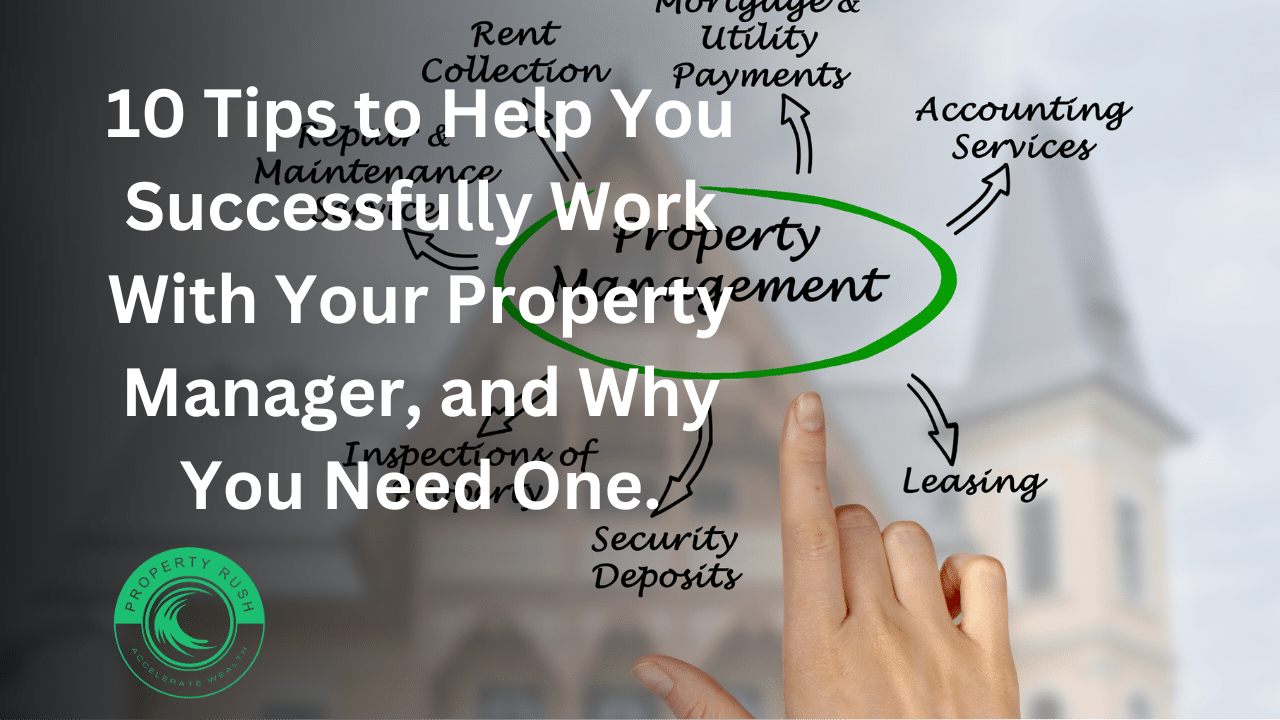Working with a Property Manager is crucial for ensuring the smooth operation and maintenance of your rental properties. Here are 10 tips to help you successfully work with your property manager, along with reasons why you need one:
- Clearly define expectations: Establish clear and detailed expectations from the beginning. Outline your specific requirements and goals for the property, including tenant selection, rent collection, property maintenance, and financial reporting.
- Regular communication: Maintain open and regular communication with your property manager. This allows you to stay informed about the property’s status, address any concerns promptly, and ensure that the manager is meeting your expectations.
- Set performance metrics: Establish measurable performance metrics that align with your property’s goals. This provides a basis for evaluating your property manager’s performance and ensures accountability.
- Regular property inspections: Schedule regular property inspections to assess its condition and verify that maintenance is being handled properly. Inspections help you identify potential issues before they become major problems and ensure that your property is well-maintained.
- Review financial reports: Regularly review financial reports provided by your property manager. This allows you to track income and expenses, assess the property’s financial performance, and identify any discrepancies or areas for improvement.
- Necessary resources: Your property manager should have access to the necessary resources to manage the property effectively. This includes required tools, software, and maintenance personnel. Ask your Property Manager for details on what tools they use to manage your property.
- Stay updated on legal regulations: Familiarize yourself with relevant local, state, and federal laws pertaining to property management. This knowledge helps you ensure that your property manager is compliant with all legal requirements and protects your interests as a property owner.
- Professional development: Ask your property manager if they are participating in professional development. This enables them to stay updated on industry trends, best practices, and new regulations.
- Evaluate qualifications: Request documents that show their certifications and qualifications.
- Maintain a positive relationship: Foster a positive working relationship with your property manager. Address any concerns or issues in a respectful manner. A positive relationship encourages better communication and cooperation.
Why you need a property manager:
- Time and convenience: Managing a property can be time-consuming, especially if you have multiple properties or a busy schedule. A property manager can handle day-to-day operations, saving you time and providing convenience.
- Expertise and experience: Property managers possess specialized knowledge and experience in managing properties. They are familiar with local markets, rental laws, tenant screening, and maintenance, which can help maximize your property’s profitability.
- Tenant management: Property managers handle tenant-related tasks such as advertising vacancies, screening applicants, lease agreements, rent collection, and addressing tenant concerns. They ensure a smooth tenant experience, reducing your involvement in tenant management.
- Property maintenance: A property manager oversees property maintenance, including repairs, inspections, and regular upkeep. They can coordinate with contractors and ensure that your property remains in good condition.
- Marketing and filling vacancies: Property managers have expertise in marketing properties and attracting potential tenants. They use various advertising channels, screen applicants, and fill vacancies efficiently, minimizing rental income loss.
- Financial management: Property managers handle financial aspects such as rent collection, budgeting, expense tracking, and financial reporting. Their expertise ensures proper financial management and accurate record-keeping.
- Legal compliance: Property managers are well-versed in rental laws and regulations. They can help you navigate legal requirements, ensuring that your property operations are in compliance with applicable laws.
- Emergency handling: In case of emergencies or urgent situations, property managers can quickly address issues, coordinate necessary repairs, and ensure the safety and well-being of tenants and the property.
Overall, a property manager can provide valuable support by efficiently managing your property, saving you time and effort, and ensuring optimal financial performance. If you would like more information about Property Rush Management Services, please visit our Property Management page.






